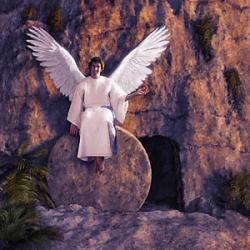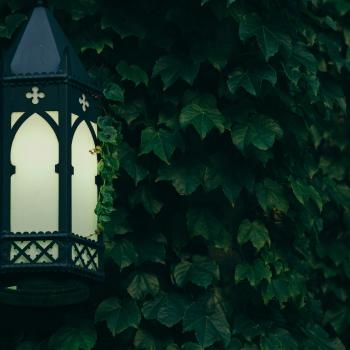This World is not Conclusion.
A Species stands beyond.... ~ Emily Dickinson
One of the enduring questions among all peoples, a question illustrated in myth and story, sacred text and ritual, is the question of what happens when we die. In the Christian and older Jewish traditions, the answer to that question evolved over the thousand-or-so years of biblical authorship.
The Jewish scriptures are ambivalent on the question: in some places (e.g. Gen. 37:35; Job 7:9; Ps. 6:6), death is a movement to Sheol, where there is no remembrance of God. By the 2nd century, though, there is faith in a resurrection and judgment of the dead.
Many of those who sleep
in the dust of the earth shall awake;
Some to everlasting life,
others to reproach and everlasting disgrace (Dan. 12:2).
The souls of the righteous are in the hand of God,
and no torment shall touch them.
......................
Chastised a little, they shall be greatly blessed,
because God tried them
and found them worthy of himself.
......................
They shall judge nations and rule over peoples,
and the LORD shall be their King forever.
......................
But the wicked shall receive a punishment to match their thoughts,
since they neglected righteousness and forsook the LORD (Wisdom 3:1, 5, 8, 10)
In Jesus' time, as we learn from the New Testament, there was division over this question of resurrection of the dead between the Pharisees and Sadducees (see Acts 23:8; Mt. 22:23; Mk. 12:18). Jesus' own position becomes clear in the gospels. Of the many so called eschatological discourses (statements about the end of the world), perhaps the most memorable is that of Matthew 25.
[Jesus said], "When the Son of Man comes in his glory, and all the angels with him, he will sit upon his glorious throne, and all the nations will be assembled before him. And he will separate them one from another, as a shepherd separates the sheep from the goats. He will place the sheep on his right and the goats on his left. Then the king will say to those on his right, 'Come, you who are blessed by my Father. Inherit the kingdom prepared for you from the foundation of the world. For I was hungry and you gave me food, I was thirsty and you gave me drink, a stranger and you welcomed me, naked and you clothed me, ill and you cared for me, in prison and you visited me.' Then the righteous will answer him and say, 'Lord, when did we see you hungry and feed you, or thirsty and give you drink? When did we see you a stranger and welcome you, or naked and clothe you? When did we see you ill or in prison, and visit you?' And the king will say to them in reply, 'Amen, I say to you, whatever you did for one of these least brothers of mine, you did for me.' Then he will say to those on his left, 'Depart from me, you accursed, into the eternal fire prepared for the devil and his angels. For I was hungry and you gave me no food, I was thirsty and you gave me no drink, a stranger and you gave me no welcome, naked and you gave me no clothing, ill and in prison, and you did not care for me.' Then they will answer and say, 'Lord, when did we see you hungry or thirsty or a stranger or naked or ill or in prison, and not minister to your needs?' He will answer them, 'Amen, I say to you, what you did not do for one of these least ones, you did not do for me.'"
Jesus' answer to the question "what happens when we die?" emerges clearly in this and other texts: God judges us and separates the good from the bad.
The author of the book of Revelation picks up imagery from the older book of Daniel in describing those who have served God in life.
These are the ones who have survived the time of great distress; they have washed their robes and made them white in the blood of the Lamb. For this reason they stand before God's throne and worship him day and night in his temple. The one who sits on the throne will shelter them. They will not hunger or thirst anymore, nor will the sun or any heat strike them. For the Lamb who is in the center of the throne will shepherd them and lead them to springs of life-giving water, and God will wipe away every tear from their eyes (Rev. 7:15-17).





